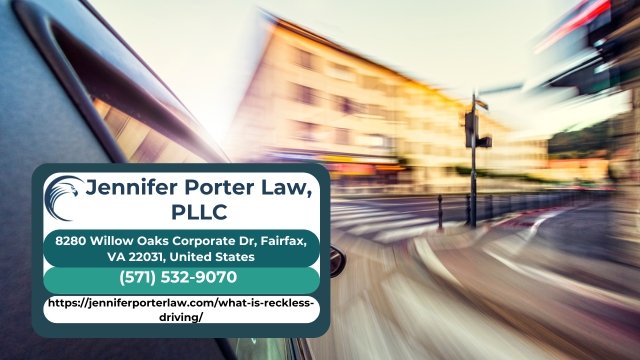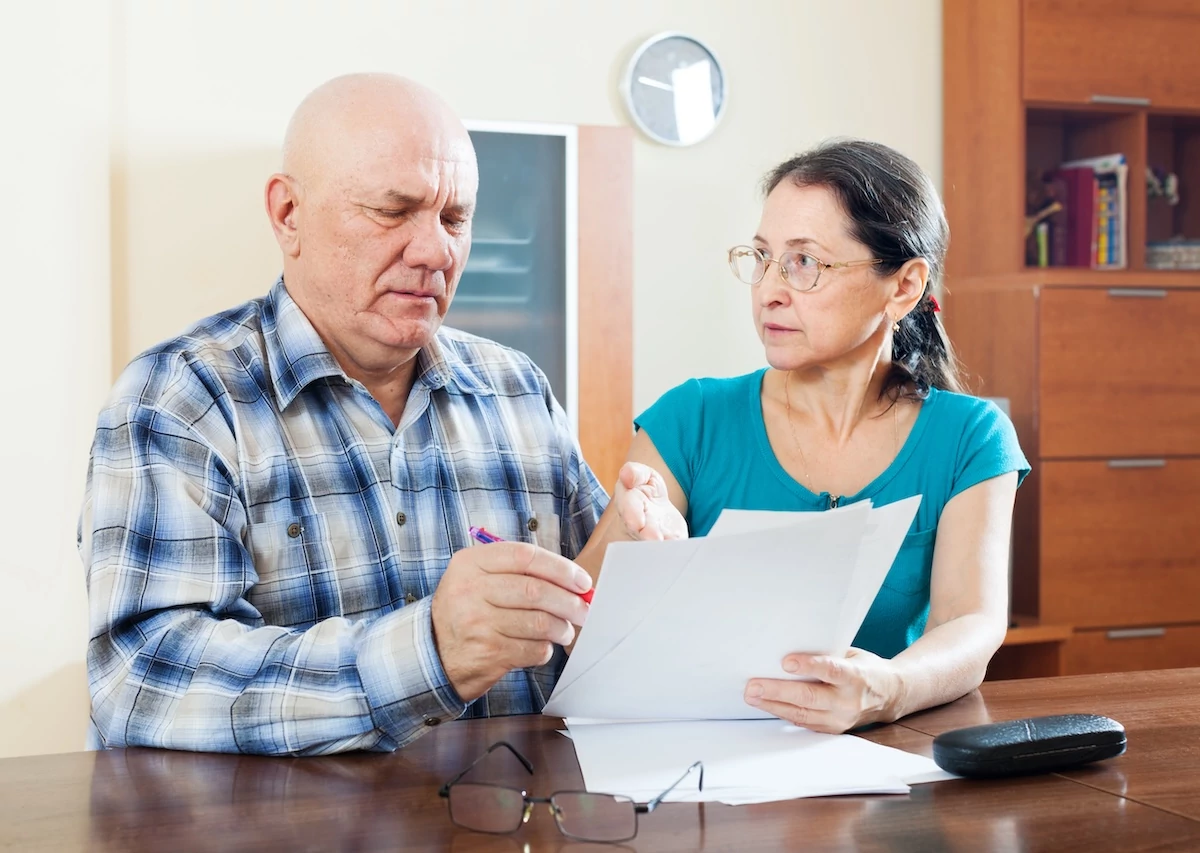Traffic laws are designed to keep roads safe, but not all drivers adhere to the rules. While traffic violations can impose legal penalties, some actions behind the wheel can carry more serious consequences. When a driver’s behavior is considered dangerous or poses a risk to others, it may result in harsher enforcement under laws that address reckless conduct on the road.
For those affected by reckless driving accidents, legal support can be crucial in managing the aftermath. From dealing with injuries to handling insurance claims and liability issues, having an experienced attorney can make a difference. At Jennifer Porter Law, PLLC, our Northern Virginia car accident lawyers assist clients in Northern Virginia with car accident cases, helping seek the compensation they deserve. Call (571) 532-9070 to discuss your case and explore your legal options.
What is Reckless Driving in Virginia?
Reckless driving in Virginia is a serious traffic offense that goes beyond a simple speeding violation. Under Virginia Code § 46.2-862, a driver can be charged with reckless driving if they operate a motor vehicle on a highway in the Commonwealth under either of the following conditions:
- Driving 20 miles per hour or more over the posted speed limit.
- Driving over 85 miles per hour, regardless of the posted speed limit.
This means that even if the speed limit is 70 mph, a driver traveling at 86 mph can face reckless driving charges. Unlike a standard speeding ticket, reckless driving in Virginia is a Class 1 misdemeanor, which carries penalties that may include fines, license suspension, and even jail time.
In addition to excessive speed, reckless driving can also be charged for other dangerous driving behaviors, such as aggressive driving, racing, or failing to yield. Because it is considered a criminal offense rather than a simple traffic infraction, a reckless driving conviction can have long-term consequences, including increased insurance rates and a permanent criminal record.
Types of Actions That Constitute Reckless Driving
Reckless driving in Virginia includes a variety of dangerous driving behaviors beyond just excessive speeding. The law considers any action that endangers life, limb, or property as reckless driving. Several specific actions are outlined in Virginia Code §§ 46.2-852 through 46.2-869, each addressing different hazardous driving behaviors.
- Failure to Maintain Control (§ 46.2-853) – Driving a vehicle that is not under proper control or has faulty brakes.
- Obstructed Driver’s View (§ 46.2-855) – Operating a vehicle that is overloaded or has too many front-seat passengers, impairing the driver’s ability to see or control the vehicle.
- Passing on Hills or Curves (§ 46.2-854) – Overtaking another vehicle on or near the crest of a hill or a curve where visibility is limited.
- Passing Two Vehicles Abreast (§ 46.2-856) – Attempting to pass two vehicles traveling side by side in the same direction unless on a highway with at least three lanes in each direction.
- Driving Two Abreast in a Single Lane (§ 46.2-857) – Operating a vehicle alongside another in a single-lane roadway, except for motorcycles riding side by side.
- Passing at a Railroad Crossing (§ 46.2-858) – Overtaking another vehicle at a railroad crossing or an intersection, unless in a designated passing zone.
- Failing to Stop for a School Bus (§ 46.2-859) – Failing to stop for a school bus loading or unloading children, except in cases where a physical barrier separates traffic lanes.
- Failure to Signal Properly (§ 46.2-860) – Not using turn signals or brake signals as required by law.
- Driving Too Fast for Conditions (§ 46.2-861) – Exceeding a safe speed based on traffic, weather, and road conditions, even if within the posted speed limit.
- Failure to Yield Right-of-Way (§ 46.2-863) – Not yielding when entering a highway from a side road where oncoming traffic is within 500 feet.
- Reckless Driving in Non-Highway Areas (§ 46.2-864) – Driving recklessly in parking lots, school or church driveways, and other private or restricted areas.
- Illegal Racing (§ 46.2-865) – Engaging in a race with another vehicle on public roads or private property open to the public.
- Aggressive Driving (§ 46.2-868.1) – Violating multiple traffic laws with intent to intimidate, harass, or obstruct other drivers.
Each of these actions can lead to a reckless driving charge, which carries serious legal consequences.

Reckless Driving vs. Ordinary Speeding: Why Reckless Driving Is Not “Just a Ticket”
Reckless driving in Virginia is not the same as a simple speeding violation. Many drivers assume that going over the speed limit results in a minor ticket, but in some cases, excessive speed leads to a criminal charge. The distinction between reckless driving and ordinary speeding lies in both the severity of the offense and the legal consequences.
Traffic Infraction vs. Criminal Charge
- Ordinary Speeding: A traffic infraction that results in a fine and possibly demerit points on a driver’s license. For example, going 10 mph over the limit is typically a minor offense.
- Reckless Driving: A Class 1 misdemeanor under Virginia law. If a driver exceeds the speed limit by 20 mph or more or drives over 85 mph regardless of the limit, they are not just receiving a ticket—they are being charged with a crime.
Key Differences Between Speeding and Reckless Driving
- Court Appearance Required: Unlike a standard speeding ticket, a reckless driving charge cannot be prepaid. The driver must appear in court to answer for the charge.
- Criminal Record Impact: Reckless driving is a misdemeanor offense, meaning a conviction results in a permanent criminal record, which can affect employment, security clearances, and background checks.
- Potential for Jail Time: While a regular speeding ticket results in a fine, reckless driving carries the possibility of up to 12 months in jail.
- License Suspension: Courts may suspend a driver’s license for reckless driving, whereas speeding violations usually do not result in suspension unless there are repeated infractions.
Common Misconception: “I Was Just Speeding”
Many drivers are surprised when they receive a reckless driving charge instead of a simple speeding ticket. A common scenario is a driver going 90 mph in a 70 mph zone—this automatically qualifies as reckless driving under Virginia law. It is not an offense that can be resolved by mailing in a fine, and failure to appear in court can result in additional penalties.
Reckless driving is a serious charge that should not be taken lightly. Unlike minor speeding violations, it carries lasting legal and financial consequences that can impact a driver’s future.
Penalties for a Reckless Driving Conviction in Virginia
The penalties for a reckless driving conviction can range from fines and license suspension to jail time, depending on the specific circumstances of the case.
Class 1 Misdemeanor Penalties
A reckless driving conviction under § 46.2-868(A) is punishable by up to 12 months in jail and a fine of up to $2,500. In addition, the court may impose a license suspension of up to six months, restricting the driver’s ability to operate a vehicle during that period. The Virginia Department of Motor Vehicles (DMV) will also assess six demerit points, which can remain on the driving record for up to 11 years. Accumulating too many points can lead to additional penalties, including further license suspensions.
Many drivers underestimate the seriousness of a reckless driving charge. However, because it is a misdemeanor, a conviction results in a criminal record that can appear on background checks. This can have significant implications for employment, housing applications, and professional licensing.
Class 6 Felony for Reckless Driving Resulting in Death
Under § 46.2-868(B), a reckless driving charge is elevated to a Class 6 felony if it results in the death of another person and the driver did not have a valid license at the time due to suspension or revocation from a prior moving violation. A conviction carries a potential prison sentence of one to five years. However, at the court’s discretion, the penalty may be reduced to up to 12 months in jail and a fine of up to $2,500. In addition to the criminal penalties, a felony conviction leads to the loss of certain civil rights, such as the right to vote or possess a firearm, and may impact future job opportunities.
Other Consequences of a Reckless Driving Conviction
Beyond the legal penalties, a reckless driving conviction can have long-term financial consequences. Insurance companies consider reckless driving a major violation, often leading to substantial increases in insurance premiums. In some cases, insurers may even choose to cancel coverage, forcing drivers to seek expensive high-risk policies.
The permanent criminal record associated with a reckless driving conviction can also affect various aspects of life, including employment opportunities and professional licensing. Many employers conduct background checks, and a reckless driving conviction may raise concerns, especially for jobs that require driving or security clearances. Additionally, individuals with a reckless driving conviction may face travel restrictions, as some countries impose entry restrictions on those with criminal records.
| Offense | Penalties | Additional Consequences |
|---|---|---|
| Class 1 Misdemeanor Reckless Driving (§ 46.2-868(A)) | Up to 12 months in jail, up to $2,500 fine, license suspension (up to 6 months), 6 demerit points (stays on record for up to 11 years) | Criminal record affecting employment, housing, and professional licensing |
| Class 6 Felony Reckless Driving Resulting in Death (§ 46.2-868(B)) | 1-5 years in prison (or at court’s discretion, up to 12 months in jail), up to $2,500 fine | Loss of civil rights (voting, firearm possession), difficulty securing future employment |
| Other Consequences | Increased insurance premiums, possible cancellation of coverage | Travel restrictions, impact on background checks for driving or security-related jobs |
What to Do If You Are a Victim of Reckless Driving in Virginia
Being involved in an accident caused by a reckless driver can be a traumatic and overwhelming experience. Whether the incident leads to injuries, property damage, or emotional distress, knowing what steps to take can help protect your health, legal rights, and financial recovery. As an accident victim, taking the right actions can strengthen your case and improve your chances of obtaining fair compensation.
Seek Medical Attention
Your health and safety should always be the top priority after an accident. Even if injuries seem minor, it is important to seek medical attention as soon as possible. Some injuries, such as concussions, soft tissue damage, or internal trauma, may not show immediate symptoms but can worsen over time. A medical evaluation will document your injuries, which can serve as essential evidence if you need to file an insurance claim or pursue legal action. Delaying treatment can not only harm your health but also give insurance companies a reason to downplay or deny your claim.
Report the Incident to Law Enforcement
Calling the police is an important step after a reckless driving accident. Law enforcement officers will assess the scene, take witness statements, and file an official accident report. This report serves as a critical piece of evidence when proving liability and holding the reckless driver accountable. If the at-fault driver was cited for reckless driving, this can strengthen your case when negotiating with insurance companies or pursuing legal action. Be sure to obtain a copy of the police report for your records.
Gather Evidence at the Scene
If you are physically able to do so, gathering evidence at the accident scene can be beneficial. Take clear photos and videos of the damaged vehicles, skid marks, traffic signals, road conditions, and any visible injuries. If there were witnesses, ask for their contact information, as their statements could provide additional support for your claim. Keep track of all medical records, receipts for treatment, and any communications related to the accident. The more evidence you have, the stronger your case will be when dealing with insurance companies or in court.
Exchange Information with the Other Driver
It is essential to obtain the reckless driver’s name, contact details, insurance information, and vehicle registration. However, be careful with what you say at the scene. Avoid making statements that could be interpreted as admitting fault or downplaying the severity of the incident. If the other driver is aggressive, uncooperative, or attempting to leave the scene, wait for law enforcement to arrive and handle the situation.
Notify Your Insurance Company
Reporting the accident to your insurance company as soon as possible is crucial. Provide them with the details of the incident, but be cautious when giving statements. Insurance adjusters often look for ways to minimize payouts or shift blame, so it may be in your best interest to consult with a lawyer before accepting any settlement offers. If the reckless driver’s insurance company contacts you, avoid making any recorded statements without legal guidance, as they may use your words against you to reduce their liability.
Consult a Northern Virginia car Accident Lawyer
Reckless driving accidents often involve complex legal and insurance issues. If you suffered injuries, property damage, or other losses, consulting with an experienced car accident lawyer can help you understand your legal rights and maximize your compensation. An attorney can assist with investigating the accident, gathering evidence, negotiating with insurance companies, and filing a personal injury claim if necessary. Legal representation can be especially important if the reckless driver is uninsured, underinsured, or facing criminal charges related to the accident.
Top Rated Legal Guidance from Jennifer Porter Law, PLLC
Reckless driving can have serious consequences, especially when it leads to an accident. Understanding the legal implications and knowing your rights can help you take the right steps after an incident. Whether you are dealing with injuries, insurance claims, or liability concerns, seeking professional legal assistance can make a difference in your case.
Jennifer Porter Law, PLLC provides legal support for those affected by reckless driving accidents in Northern Virginia. With experience handling car accident claims, we work diligently to protect our clients’ interests and pursue fair compensation. For quality legal guidance, call us today at (571) 532-9070 to schedule a consultation and discuss your options.



